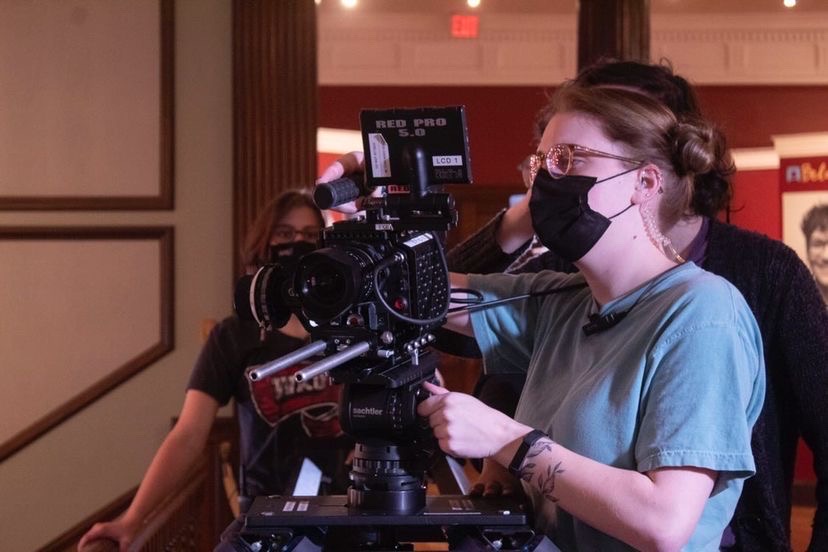Women in film overcome sexism, disrespect to excel in their fields
April 13, 2022
Women accounted for just 25% of those working in key behind-the-scenes roles – including directors, writers, executive producers, producers, editors and cinematographers – on the top 250 grossing films in 2021, up from 23% in 2020, according to Center for the Study of Women in Television and Film.
Women in the world of film still fight an uphill battle to receive the same amount of respect and visibility as their male counterparts. The story is no different for the women in WKU’s film program.
Sara Thomason, a film professor, helped structure the curriculum for the Bachelors of Fine Arts in Film. For Thomason, she has had a mix of experiences as a woman in the film industry, which has led her to focus on inclusion at WKU.
“We always have inclusion in the forefront of our minds when planning or making changes within WKU Film,” Thomason said. “I think there’s a stereotypical image that comes to mind when one thinks of a ‘film student’ that we try to combat because that’s just not the reality of the demographic of our programs. We try to bring in diverse filmmakers for screenings and Q&As, screen films made by filmmakers of various backgrounds in order to expose our students to the reality of what a filmmaker looks like: anything!”
Every student has the opportunity to make their own film while in the program in order to express themselves, Thomason said.
“Part of our goal in preparing our film students for careers in film and television is to create a more inclusive generation of filmmakers,” Thomason said. “Eventually, this generation will be running the studios and making the hiring decisions.”
Thomason felt it was difficult to prove herself while working in film. If she seemed confident and knowledgeable, she said her experience was “alienating.”
“It felt like I was being pushed into an impossible position: I could either be respected or I could be liked, but the culture around me made it clear I couldn’t be both,” Thomason said.
She said she felt small during some of her time working in film. Thomason said that she encountered as many men who treated her well as men who treated her poorly.
“A director, who is now a director in a popular franchise, when I asked him for career advice told me, ‘You’ll get meetings, but only if they’re dates,’” Thomason said. “On another occasion, an agent told me to set a meeting with him because ‘female cinematographers are hot right now and I need some.’ I’ve been groped, stalked, and harassed, all in the context of working on set.”
Despite this, Thomason still had positive experiences to share.
“I was fortunate enough to begin my career in film and television at a time when the industry was beginning to acknowledge and attempt to correct inequities,” Thomason said. “When I was working on smaller-budget projects with collaborators who I knew and trusted, I felt like my input was valued, period; but also, that I was valued beyond what I could bring to the project ‘from a woman’s perspective.’”
Jennifer Ross, a sophomore in the film production program, said she has always felt that the program is inclusive.
“I’ve literally found my family in WKU Film,” Ross said. “It’s literally been my home for the past two years now. For me personally, I haven’t felt like there’s been any sexism in the film program… as I look at pictures of our film program, probably a majority, or at least half or more being women in our program, which is really, really interesting.”
A majority – 62% – of WKU students are female, according to the 2021 WKU Factbook. In Potter College of Arts and Letters, 63% of all students are female.
“To be a woman in film and share my story as a creative woman […] then going out into an industry that doesn’t encourage that is something that’s stressful, but what my professors and what WKU Film has encouraged is that we want to reshape that narrative and to encourage women and men to be as creative as possible and to break that stigma,” Ross said. “Right now I’m only halfway through my career in college, but WKU Film has encouraged me to tell the stories that I want to tell as a woman.”
Johnna Kuegel is a sophomore studying film production, but her experience differs from Ross’. Kuegel originally went to the University of Kentucky but took a break after she decided her major wasn’t what she wanted to pursue.
“I’ve already made an investment in college in the past and it just wasn’t my thing,” Kuegel said. “It feels like the stakes are higher. I think having that experience makes me take it very seriously, and that’s not necessarily the experience of everybody else that I’m around.”
Kuegel feels less included than Ross and describes her cohort as “clique-y.”
“I got called ‘the bitchy first ad’ because I was in charge,” Kuegel said. “I had to make sure that every single person like me was responsible for everybody. I had to make sure everybody was doing their job. The guy who called me that [name] is very similar to me on a set, but his set was fun. We acted very similarly in that same position. And I got called bitchy for doing my job.”
Despite these feelings, Kuegel said that she is grateful to learn how to create films and work on sets.
“I do love that I learn from three women who work in the industry,” Kuegel said. “I hope that I get to continue to work with other women when I graduate.”
Content Editor Debra Murray can be reached at [email protected]. Follow her on Twitter @debramurrayy.













